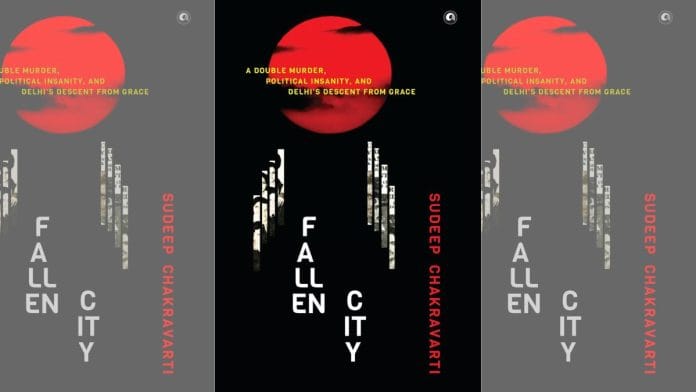Thank you dear subscribers, we are overwhelmed with your response.
Your Turn is a unique section from ThePrint featuring points of view from its subscribers. If you are a subscriber, have a point of view, please send it to us. If not, do subscribe here: https://theprint.in/subscribe/
This book talks about Kuljeet Singh (alias Ranga) and Jasbir Singh (alias Billa) abduction and then murdered siblings Geeta and Sanjay. Although the children were kidnapped for ransom, they were slain when the kidnappers discovered that their father was a naval officer, assuming that he was not affluent. Both men first admitted to raping Geeta before she was murdered. They eventually recanted their statements.
Geeta and Sanjay were scheduled to appear on a radio show at All India Radio on Saturday, August 26, 1978. Their father was supposed to pick them up after the All India Radio programme at 9 p.m. On the evening of 26 August, Inderjeet Singh, a junior engineer with the Delhi Development Authority who was riding his scooter home from work, observed a car near Willingdon Hospital’s casualty building. He observed a girl and a youngster in the back, fighting with the driver and another man. He pulled up and lined up with the running car. The youngster showed Inderjeet Singh his injured shoulder and waved his hands, screaming for aid. Inderjeet followed the car. However, he lost control of the car when it ran a red light at a traffic crossing. Inderjeet noted the proper car number and reported it to Rajendra Nagar Police station in Delhi. However, the police officer informed his colleague that the particular location where Inderjeet first noticed something strange was outside of their authority. So they informed the Police Control Room, which forwarded everything to the Mandir Marg police station.
At 8:45 p.m., their father drove his scooter from home to the radio station. He could not find his children at the designated location. He was informed at the office that the children did not arrive. When the father called to see if the children had arrived home, their mother said no. Their father returned home and called his family and friends to see if the children were with them.
The kidnappers drove to Willingdon Hospital in a car bearing the number DHI 280 because one of them, Billa, had a cut on his head. When asked, they gave doctors fake identities and claimed they had been attacked by robbers. The constable on duty at the hospital took their statement, which stated that they were attacked near Kali Mandir on Bangla Sahib road.
On August 28, a little after midnight, the dairymen discovered a stink while driving their animals along the Upper Ridge Road. When they proceeded into the bushes, they discovered two bodies, and when Delhi Police arrived, they found no evidence other than the blood and the mutilated, putrefying bodies. A police team soon arrived at Geeta and Sanjay Chopra house to identify the remains after sending brief information about the two bodies to their parents, Captain Madan and Roma Chopra, the previous day. After learning confirmation of their children’s bodies, both cried and grieved, and his wife Roma went silent in sadness. As shocked parents and a stunned city waited, the brutalised siblings were forensically examined by a police surgeon who would later be named Public Witness 30 by the prosecution seeking justice for the murders of siblings. Politicians paid visits to the parents. There was a protest march and remembrance for justice.
A few weeks later, on September 8, 1978, the kidnappers were apprehended on a train. The two kidnappers boarded the Kalka Mail when it slowed near the Yamuna River Bridge near Agra. Because the compartment they entered was intended for military personnel, they were requested to present their identification cards. They started a fight with the soldiers and were put down. Lance Naik A. V. Shetty knew them from a newspaper image. They were handed over at New Delhi’s railway station on September 9, 1978.
The analysis of the fingerprints lifted from the Fiat in Adarsh Nagar had also arrived from the Central Forensic Science Laboratory in Hyderabad. The court established that the two had come to Delhi to flee the Bombay police. They landed in Delhi on August 16 and resided in several locations under fictitious names. They had two ceremonial kirpans, one tiny and one huge, and had them sharpened elsewhere. Billa knew how to steal cars and had false number plates painted. He took a Fiat from in front of the Ashoka Hotel. They booked a room in Majlis Park two months in advance. They picked up the children between 6:30 and 6:40 p.m. on August 26. The youngster sustained a wound on his shoulder. At 7:30 p.m., the car was parked near Buddha Jayanti Park. Ranga bought two ice creams and three Campa Colas. The boy’s autopsy revealed that he had consumed milk products before dying. At 9:30 p.m., the youngsters were slain in the bushes along Upper Ridge Road in Delhi. The girl’s body was discovered with her undergarments missing. Ranga abandoned the car in Majlis Park, a few blocks from their home, on August 30.
Although the confessions were considered in the sentencing, they were noted to have certain relevant details. They challenged their death sentence and then petitioned the president for clemency. However, on January 31, 1982, both were hanged. Billa was calm, but Ranga refused to go to the gallows. Their bodies were not claimed by their loved ones.
These pieces are being published as they have been received – they have not been edited/fact-checked by ThePrint


